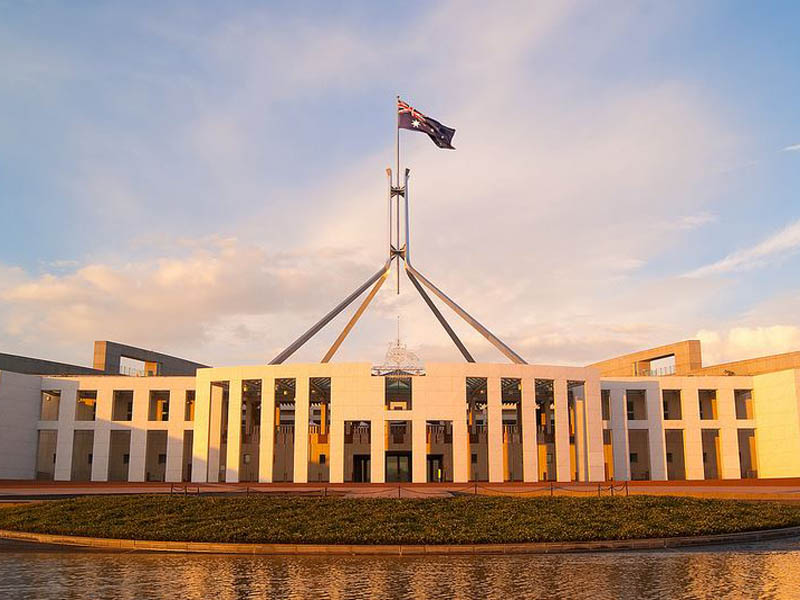The next Prime Minister of Australia will be decided on Friday afternoon after the Turnbull government sensationally shut down Parliament and called for a leadership spill, with three main contenders emerging.
Prime Minister Malcolm Turnbull told media on Thursday that he would call a Liberal Party room meeting and resign from the top job if a circulating petition received the necessary 43 signatures.
Former Home Affairs minister Peter Dutton, Treasurer Scott Morrison and Deputy Prime Minister Julie Bishop are all likely to throw their hats in the ring for the leadership ballot, with the meeting expected to start at midday Friday.

It comes as most of the government’s key tech-focused ministers have resigned from their positions, throwing its tech and digital transformation agenda in turmoil.
Prominent members of the tech and startup community have described the leadership turmoil as a “nightmare” for the sector, with fears it could jeopardise programs like the Global Talent Scheme and the anticipated release of the Digital Economy Strategy.
The leadership battle is viewed as a distraction which would result in further delays to a number of tech-focused pieces of legislation that are already languishing in Parliament.
After three key frontbenchers announced on Thursday morning that they no longer believed Mr Turnbull had the support of the party, the government adjourned the House of Representatives in an unprecedented move.
Mr Turnbull then held a press conference where he dug in, demanding Mr Dutton produce a petition with the necessary number of signatures before a party room meeting would be called. He said the move against him was a “very deliberate effort to pull the Liberal Party further to the right”.
He said if the spill motion got the support of the party, he would not contest the leadership vote, and would leave the Parliament entirely. If this happened, Mr Turnbull said the public will be “crying out for an election”.
The three main contenders to be the next Prime Minister of Australia have vastly different track records on tech and innovation. Mr Dutton has focused on immigration and security-focused tech laws, Mr Morrison’s efforts have centred on the FinTech sector, and Ms Bishop has focused on foreign relations and women in tech.
Mr Dutton is viewed as a step backwards for the tech and startup sectors, with some concerned he would mark a return to an Abbott era approach to innovation policy. Mr Morrison is seen as much more open to technology-focused policies, especially in light of his work on FinTech reforms.
Mr Dutton’s recent tenure as Home Affairs minister has seen him introduce controversial facial recognition legislation to Parliament that have raised concerns of “mass surveillance”.
His department also recently unveiled draft legislation for the government’s plan to force tech companies to work with authorities to provide access to encrypted communications, a move which has been unpopular with civil and digital rights groups, as well as tech companies.
There are also already concerns within the tech community on how Mr Dutton might approach immigration and skilled visas if he takes over as Prime Minister.
Mr Morrison’s time as treasurer has seen him focus increasing on the FinTech community and introduce a number of favourable reforms and new policies for the sector, including open banking and the regulatory sandbox.
FinTech Australia chief executive Brad Kitschke has thrown his support behind Mr Morrison for the top job.
“There is no question that as treasurer, Scott Morrison has championed the role of the FinTech sector,” Mr Kitschke told InnovationAus.com.
“He was instrumental in the establishment of the FinTech bridge with the UK, created the treasurer’s FinTech Advisory Council and provided funding support for the promotion of FinTech businesses and industry bodies. The treasurer has a strong track record of supporting this ecosystem.”
Ms Bishop has served as foreign affairs minister since 2013. During this time she has led a number of initiatives aiming to encourage girls and young women to pursue a career in STEM, and also launched Australia’s International Cyber Engagement Strategy.
But for some in the tech sector, it’s time to look towards the Opposition’s tech and innovation policies already, with an assumption that whoever becomes the new Prime Minister will lose at the impending federal election.
Most of the federal government’s tech-focused ministers have now resigned from their positions.
Jobs and innovation minister Michaelia Cash tendered her resignation on Thursday morning after finding that Mr Turnbull no longer had the confidence of the party room.
Cybersecurity minister Angus Taylor, assistant minister for digital transformation Michael Keenan and assistant minister for science, jobs and innovation Zed Seselja all officially resigned on Thursday after their initial resignation offerings earlier in the week were rejected by Mr Turnbull.
“I have previously relayed to you my concerns about the direction of this government, and my views on the policies that should characterise a traditional centre-right Liberal Party. I remain steadfast in my view that these changes are critical to the future of the government and the nation,” Mr Taylor said.
“It has been my privilege to serve as a minister in this government, including as your assistant minister for cities and digital transformation. I remain deeply committed to the values of the Liberal Party, and my service to the people of Hume.”
Health minister Greg Hunt, who has been responsible for the highly controversial rollout of the My Health Record service, has also resigned.
Do you know more? Contact James Riley via Email.

